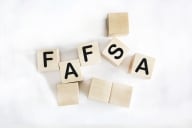You have /5 articles left.
Sign up for a free account or log in.
For-profit higher education has tried previously to create voluntary standards for quality and responsibility. But those attempts at self-regulation, which many saw as too self-serving, failed to take hold.
A new effort, announced today, probably has a better chance of making an impact. It’s being led by a nonprofit group, B Lab, which has no vested interest in the partisan fight over for-profits. And B Lab is already well-established across wide swaths of the corporate world, having signed up 1,100 companies across 120 different industries.
The group serves as a third-party verifier for its standards. It issues qualified participants a seal of approval, sort of like the U.S. Department of Energy’s Energy Saver or the fairtrade certification from Fairtrade International.
To earn the group's public seal as a "B Corporation" -- the B stands for benefit, as in public benefit -- a company must adhere to a central core of standards. But the rules are tailored to each industry.
On Tuesday, B Lab announced the formation of a 10-member working group that will try to decide where to set the bar for the for-profit education sector. The Lumina Foundation is funding that work.
The 10 selected members of the committee hail from for-profits, left-leaning think tanks and traditional higher education, and also include a former accreditor (see box).
B Lab's For-Profit Working Group
Marcia Ballinger, Lorain County Community College
David Bergeron, Center for American Progress
Deb Bushway, Capella University
John Hayek, University of Texas System
Ben Miller, New America Foundation
Stephen Porter, North Carolina State University
Ralph Wolff, Formerly at the WASC Senior College and University Commission
Matthew Yale, Laureate International Universities
Terrell Halaska, HCM Strategists
Bart Houlahan, B Lab
“They really want the deep expertise of how higher education works,” said Deb Bushway, Capella University’s vice president of academic innovation.
B Lab, which was founded in 2006, aims to redefine what it means to be successful in business. And its definition means sometimes putting social and environmental responsibility ahead of profit margins. Notable participating corporations include Patagonia, Etsy, Breckinridge Capital Advisors and Cascade Engineering.
“We have a dream that one day all companies will compete not only to be the best in the world, but the best for the world,” the group said in a promotional video about the process.
No Big Chains?
It is difficult for publicly traded companies to take the plunge. They are legally required to put shareholders first. And going the B corporation route would require difficult legal and governance changes that shareholders would need to approve.
As a result, observers said few, if any, of the large publicly traded for-profit chains will be able to participate in the B Lab experiment. That would rule out a big chunk of the industry’s enrollment.
However, B Lab’s tools could be of use to colleges that are not formal participants. They include a self-assessment test that is freely available for companies to use in order to see how they stack up. Roughly 17,000 companies have tried the assessment, which is confidential.
Businesses typically use the assessment to improve how they operate. And B Lab hopes for-profit colleges will use the forthcoming, industry-specific standards that way.
“There are many ways this could make a difference,” Bushway said, although her company, which is publicly traded, almost certainly will not be a formal participant.
While the assessments vary by industry, they generally dig into a company’s impact on its workers, the environment and the local community. The questions also get at governance practices.
For example, companies get credit for donating profits to charity, using suppliers that are based in low-income areas, covering health-care costs for employees, having women and members of minority groups in management roles, encouraging employees to volunteer, and granting bonuses to non-executives.
Businesses get an overall score after taking the assessment. To earn the seal of approval, they must earn at least an 80 out of 200 possible points. For example, Patagonia had a 107, according to a case study on the B Lab website.
The 10-member working group will be tasked with coming up with standards for the for-profit college sector.
“These standards will be completely voluntary but the hope is for-profit colleges and universities will be better able to assess, benchmark and improve their effectiveness,” according to a news release about the group’s formation. “Investors will be better able to invest in companies creating the greatest public benefit; and ultimately lead to increased availability of high-quality, for-profit options for students.”
Public Benefit Corporation Status
It’s easy to see why an outside endorsement of social responsibility would be valuable to for-profit colleges, some of which in recent years have faced fierce criticism for student recruiting practices and the value of the credentials they issue.
David Bergeron is vice president for postsecondary education at the Center for American Progress. He’s also in the working group. Bergeron thinks a for-profit B Lab seal would be useful for both policy makers and consumers.
“It would carry a lot of weight,” he said. “It’s more than just a self-assessment.”
A for-profit college could differentiate itself with the seal, a possibility B Lab touts for potential members. But earning it won’t be easy.
After passing the industry-specific assessment, which will take at least a year to develop, for-profits would need to sign the B Corporation declaration form and the group’s terms. They would also have to investigate legal requirements to alter their corporate structure.
The process is related, in sometimes confusing ways, to making the move to become a Public Benefit Corporation. That legal change means companies remain for-profit but can focus more on activities that aren’t related to boosting their profit margin. The process requires companies to alter their governance structures.
Rasmussen College, a mid-sized, privately held chain, became a Public Benefit Corporation in January. The company said it will donate more employee and facility usage time to local groups. Rasmussen will also be able to enhance its local work force development efforts under the change in status.
Observers have predicted that more for-profits may follow Rasmussen’s lead.
B Lab encourages businesses to become Public Benefit Corporations, which it said “bakes sustainability into the DNA of your company.” The nonprofit group has helped advocate successfully for benefits corporation bills that 27 states have passed. Another 14 are working on similar legislation, the group said.
Once a business has made the cut as a B Lab-approved company, it must undergo a regular audit. One in five is audited each year. And B Lab said the process is rigorous, meaning companies do fail the audits.
A confidence-inspiring audit by an outside group of a for-profit college’s social responsibility might go a long way to answering critics’ charges about them putting profits ahead of students.
But today’s news is only the first step toward making the B Lab standards a reality for the industry.








